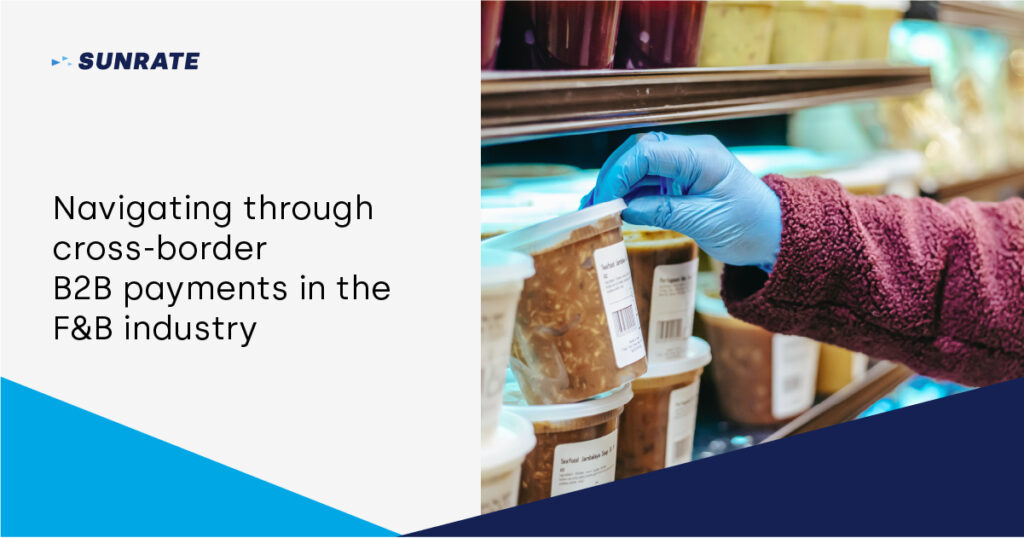

Cross-border B2B payments in the F&B industry refer to transactions where food and beverage businesses based in one country pay suppliers, partners, or vendors located in another country. These payments can be complex and challenging due to various factors such as foreign currency exchange rates, transaction fees, different payment regulations and standards, language barriers, and time zones. The ability to manage cross-border payments efficiently is critical for F&B businesses to maintain a reliable supply chain, expand their business to international markets, and remain competitive. To overcome these challenges, F&B businesses can rely on traditional finance such as banks or explore new alternatives such as FinTechs - payment service providers. Understanding the challenges and available solutions for cross-border B2B payments in the F&B industry is essential for businesses to maximise their potential for growth and success.

Challenges associated with cross-border payments for F&B businesses
Cross-border B2B payments can be a complex and challenging process for businesses in the F&B industry. While expanding to international markets is essential for growth and competitiveness, managing cross-border payments presents a unique set of challenges that must be addressed to maintain a reliable supply chain and maximise their chance of business success.
One of the main challenges associated with cross-border payments is currency exchange rates. Fluctuations in exchange rates can result in significant discrepancies between the amount paid and the amount received, affecting the profitability of businesses. In addition, foreign exchange providers often charge high transaction fees, further increasing the cost of cross-border payments.
Another challenge is the presence of hidden fees. Payment providers may apply various fees, such as transfer fees, intermediary bank fees, and currency conversion fees, which are often not disclosed upfront. This lack of transparency can result in businesses paying more than they initially anticipated, further increasing the cost of cross-border payments.
Regulatory compliance is another challenge associated with cross-border payments. Different countries have different payment regulations and standards that businesses must comply with to avoid legal risks. Non-compliance with regulations can result in delays, fines, and legal actions that can negatively affect businesses' reputation and financial performance.
Overall, cross-border B2B payments in the F&B industry can present significant challenges that businesses must overcome to maintain a reliable supply chain and maximize success. Understanding and addressing the challenges associated with cross-border payments is essential for F&B businesses to remain competitive and successful in the global market.
Best practices for cross-border payments in the F&B Industry
There are best practices that businesses can follow to optimise their cross-border payment processes - here are some best practices for cross-border B2B payments in the F&B industry:
1. Plan ahead:
Proper planning is essential for successful cross-border payments. Businesses should identify their payment needs and develop a payment strategy that considers factors such as currency exchange rates, transaction fees, and compliance requirements. By planning ahead, businesses can avoid unexpected costs and delays.
2. Use trusted payment service providers (like SUNRATE):
Businesses should work with trusted payment service providers that have a proven track record of handling cross-border payments. Working with reputable providers can help ensure the security of transactions and minimise the risk of fraud.
3. Automate payment processes:
Automating payment processes can help reduce errors and delays associated with manual processing. By using automated payment systems, businesses can ensure timely payments and reduce the risk of non-compliance with regulations.
4. Maintain accurate payment records:
Maintaining accurate payment records is essential for complying with regulations and ensuring transparent transactions. Businesses should keep detailed records of all cross-border payments, including transaction fees, exchange rates, and compliance documentation.
5. Monitor exchange rates:
Fluctuations in exchange rates can significantly impact cross-border payments. Businesses should regularly monitor exchange rates and take advantage of favorable rates to minimise costs.
By following these best practices, F&B businesses can optimise their cross-border payment processes and maximise their potential for growth and success.
SUNRATE as a payment service provider for F&B businesses
SUNRATE is an intelligent global payment and treasury management platform for businesses worldwide. Since its inception in 2016, SUNRATE is recognised as a leading solution provider and has enabled companies to operate and scale both locally and globally in 150+ countries and regions with its cutting-edge proprietary platform, extensive global network, and robust APIs.
With SUNRATE, F&B businesses can:
1. Make payments to 150+ countries almost instantly with no hidden fees or exchange rate markups.
2. Receive money in 10+ major global currencies, as if they were local payments.
3. Enjoy customisable verification models come with enhanced security protection - all our transaction instructions and AOI transmission are highly encrypted.
4. Enjoy competitive foreign exchange rates and execution services.

With its global headquarters in Singapore and offices in Hong Kong, Jakarta, London and Shanghai, SUNRATE partners with the top global financial institutions, such as Citibank, Standard Chartered, Barclays and is the principal member of both Mastercard and Visa.
To find out more about how SUNRATE can scale your F&B business and help you connect with new stakeholders, connect with us today or you could also speak to our specialist at the THAIFEX Anuga Asia event happening from May 23 - 27 at Impact Muang Thong Thani, Bangkok, Thailand, Hall 8, Booth X43. We look forward to connecting with you then!

Share to
By clicking Subscribe, you have read and agreed to our《《Privacy and Terms》》

Commercial cards are reshaping the B2B payment landscape, presenting businesses with an exciting opportunity to embrace innovation and drive their financial processes to new heights.


Effortlessly and economically settle payments to your Chinese suppliers. When it comes to making international payments, businesses seek swiftness, simplicity, and affordability. This is especially crucial for transactions involving China, as businesses frequently encounter various obstacles like rigorous declaration procedures, currency restrictions, regulatory compliance, foreign exchange uncertainties, exorbitant fees, and language barriers during administrative […]


In recent decades, China has emerged as a global economic powerhouse, reshaping the dynamics of international trade and becoming a driving force behind the success of numerous businesses worldwide. Even though it is still considered as an emerging market, the sheer scale and potential of China’s market have drawn the attention of entrepreneurs and corporations […]

We hope to use cookies to better understand your use of this website. This will help improve your future experience of accessing this website. For detailed information on the use of cookies and how to revoke or manage your consent, please refer to our < privacy policy >. If you click the confirmation button on the right, you will be deemed to have agreed to use cookies.